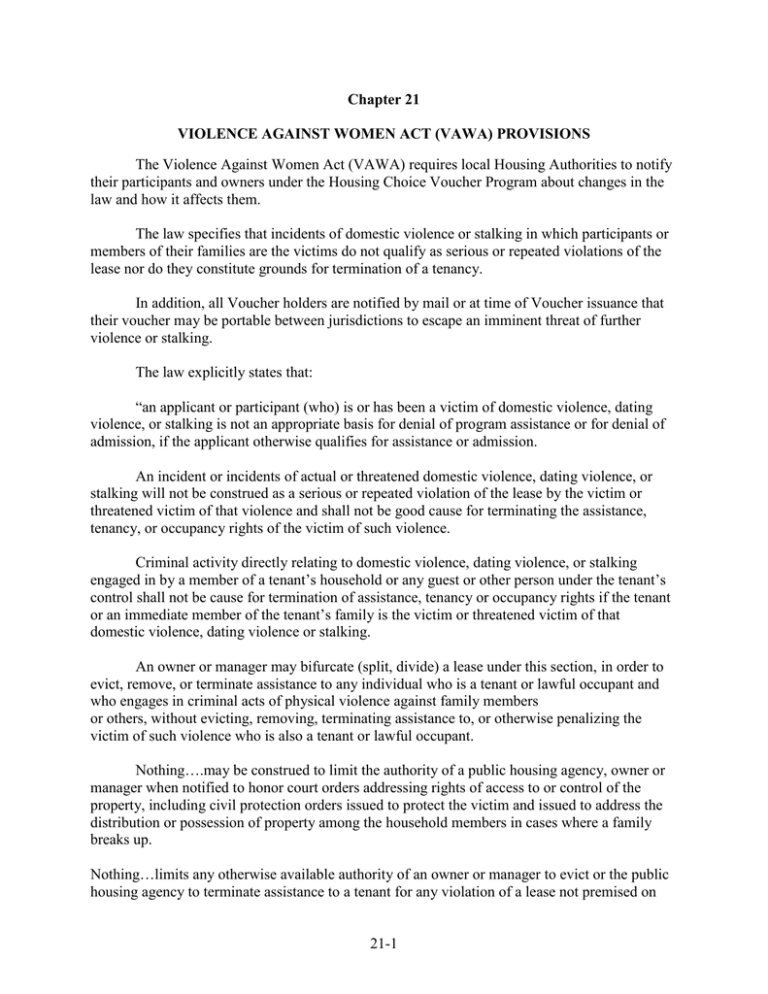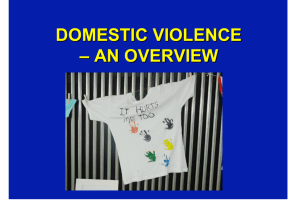
Chapter 21
VIOLENCE AGAINST WOMEN ACT (VAWA) PROVISIONS
The Violence Against Women Act (VAWA) requires local Housing Authorities to notify
their participants and owners under the Housing Choice Voucher Program about changes in the
law and how it affects them.
The law specifies that incidents of domestic violence or stalking in which participants or
members of their families are the victims do not qualify as serious or repeated violations of the
lease nor do they constitute grounds for termination of a tenancy.
In addition, all Voucher holders are notified by mail or at time of Voucher issuance that
their voucher may be portable between jurisdictions to escape an imminent threat of further
violence or stalking.
The law explicitly states that:
“an applicant or participant (who) is or has been a victim of domestic violence, dating
violence, or stalking is not an appropriate basis for denial of program assistance or for denial of
admission, if the applicant otherwise qualifies for assistance or admission.
An incident or incidents of actual or threatened domestic violence, dating violence, or
stalking will not be construed as a serious or repeated violation of the lease by the victim or
threatened victim of that violence and shall not be good cause for terminating the assistance,
tenancy, or occupancy rights of the victim of such violence.
Criminal activity directly relating to domestic violence, dating violence, or stalking
engaged in by a member of a tenant’s household or any guest or other person under the tenant’s
control shall not be cause for termination of assistance, tenancy or occupancy rights if the tenant
or an immediate member of the tenant’s family is the victim or threatened victim of that
domestic violence, dating violence or stalking.
An owner or manager may bifurcate (split, divide) a lease under this section, in order to
evict, remove, or terminate assistance to any individual who is a tenant or lawful occupant and
who engages in criminal acts of physical violence against family members
or others, without evicting, removing, terminating assistance to, or otherwise penalizing the
victim of such violence who is also a tenant or lawful occupant.
Nothing….may be construed to limit the authority of a public housing agency, owner or
manager when notified to honor court orders addressing rights of access to or control of the
property, including civil protection orders issued to protect the victim and issued to address the
distribution or possession of property among the household members in cases where a family
breaks up.
Nothing…limits any otherwise available authority of an owner or manager to evict or the public
housing agency to terminate assistance to a tenant for any violation of a lease not premised on
21-1
the act or acts of violence in question against the tenant or a member of the tenant’s household,
provided that the owner or manager does not subject an individual who is or has been a victim of
domestic violence, dating violence or stalking to a more demanding standard than other tenants
in determining whether to evict or terminate.
Nothing…. may be construed to limit the authority of an owner, manager or public
housing agency to evict or terminate from assistance any tenant or lawful occupant if the owner,
manager or public housing agency can demonstrate an actual and imminent threat to other
tenants or those employed at or providing services to the property if that tenant is not evicted or
terminated from assistance.”
The law also specifically states that:
“An owner, manager or public housing agency ….may request that an individual certify
via a HUD approved certification form that the individual is a victim of domestic violence,
dating violence, or stalking, and that the incident or incidents in question are bona fide incidents
of such actual or threatened abuse….Such certification shall include the name of the perpetrator.
The individual shall provide such certification within 14 business days after the owner, manager
or public housing agency requests such certification.
If the individual does not provide the certification within 14 business days after the
owner, manager or public housing agency or assisted housing provider has requested such
certification in writing, nothing ….may be construed to limit the authority of an owner or
manager to evict, or the public housing agency or assisted housing provider to terminate voucher
assistance for any tenant or lawful occupant that commits violations of a lease. The owner,
manager, public housing agency or assisted housing provider may extend the 14-day deadline at
their discretion.
An individual may satisfy the certification requirement ….by providing the requesting
owner, manager or public housing agency with documentation signed by an employee, agent, or
volunteer of a victim service provider, an attorney, or a medical
professional, from whom the victim has sought assistance in addressing domestic violence,
dating violence, sexual assault or stalking, or the effects of the abuse, in which
the professional attests under penalty of perjury to the professional’s belief that the incident or
incidents in question are bona fide incidents of abuse, and the victim of
domestic violence, dating violence or stalking has signed or attested to the documentation or by
producing a Federal, State, tribal, territorial or local police or court record.”
The law also permits the owner, manager or public housing agency, at their discretion, to
accept a self-certification from the victim as to the domestic violence, dating violence, sexual
assault or stalking.
HUD has provided such a certification form, form HUD-50066.
If a tenant, applicant or a member of the tenant/applicant family are a victim or
threatened victim of domestic violence, dating violence, sexual assault or stalking and wish to
21-2
port the Voucher to another jurisdiction or are threatened with eviction because of such
incidents, they are required to contact their Housing Authority counselor immediately.
The victim or alleged victim, whether a participant or applicant, will then have an
opportunity to complete the certification form and/or provide the documentation as required so
that they may maintain tenancy and assistance or be issued a Voucher to relocate.
In addition, new Housing Assistance Payments Contracts and lease addendums have been
added which incorporate the VAWA provisions. These documents, too, were just recently
provided by HUD to local HA’s.
21-3
Attachment A
Delaware Metropolitan Housing Authority
Five-Year and Annual Plans
Fiscal Years 10/01/2015 - 10-01/2019
Violence Against Women Act Report
A goal of the Delaware Metropolitan Housing Authority (DMAH) is to fully comply with the
Violence Against Women Act (VAWA). It is our objective to work with others to prevent
offenses covered by VAWA to the degree we can.
DMHA provides or offers the following activities, services, or programs, either directly or in
partnership with other service providers, to child or adult victims of domestic violence, dating
violence, sexual assault, or stalking.
Through cooperation with the local domestic violence agencies and local law
enforcement agencies, any cases of violence described are referred for assiatance.
The local domestic violence agencies include Turning Point, CHOICES, and Ohio
Alliance to End Sexual Violence.
DMHA provides or offers the following activities, services, or programs that help child and adult
victims of domestic violence, dating violence, sexual assault, or stalking, to obtain or maintain
housing.
The same methods as described herein are used, making referrals to local domestic
violence agencies and local law enforcement agencies for needed service and
assistance.
DMHA provides of offers the following activities, services, or programs to prevent domestic
violence, dating violence, sexual assault, and stalking, or to enhance victim safety in assisted
families.
The same methods as described herein are used, making referrals to local domestic
violence agencies and local law enforcement agencies for needed service and
assistance.
DMHA has the following procedures in place to assure applicants, residents and participants are
aware of their rights and responsibilities under the Violence Against Women Act:
The Section 8 Administrative Plan has been revised to include screening and
termination language related to the Violence Against Women Act.
The orientation for new participants includes information on their rights and
responsibilities under the Violence Against Women Act.
21-4








